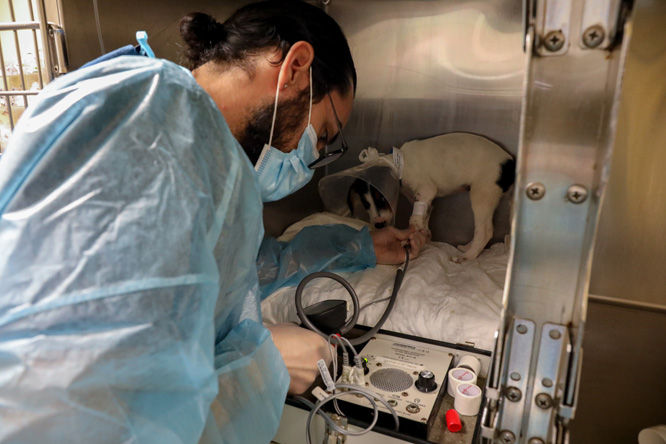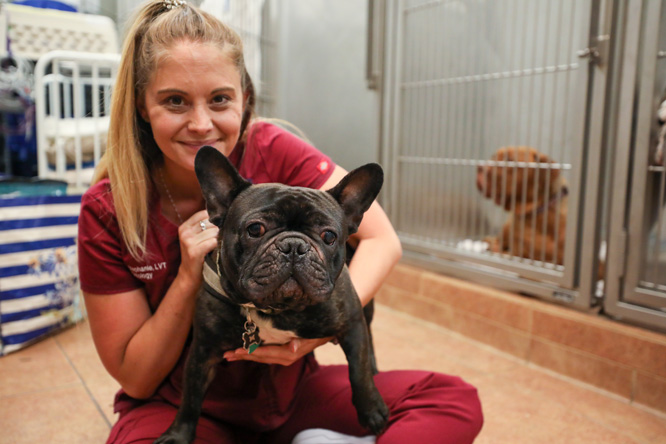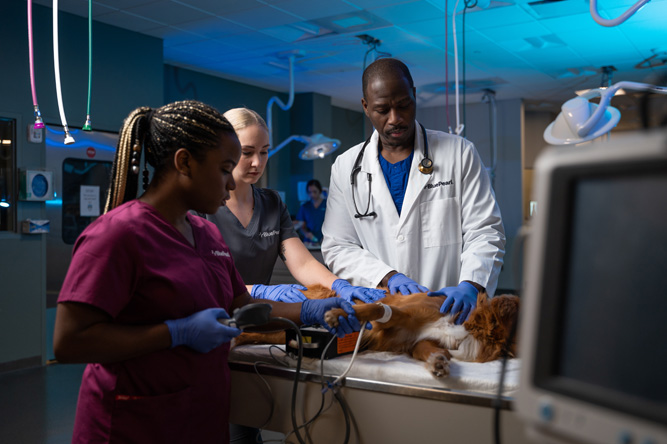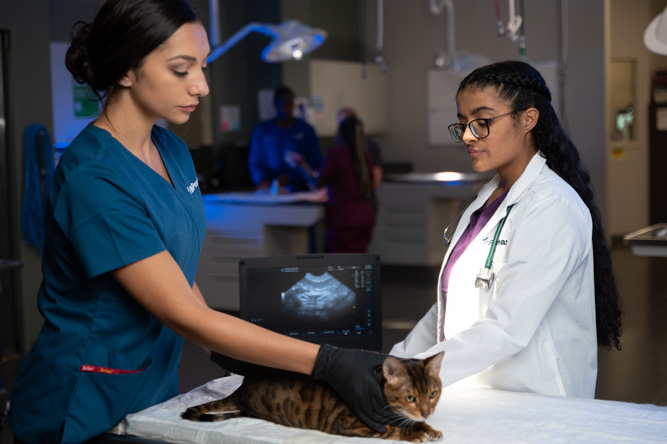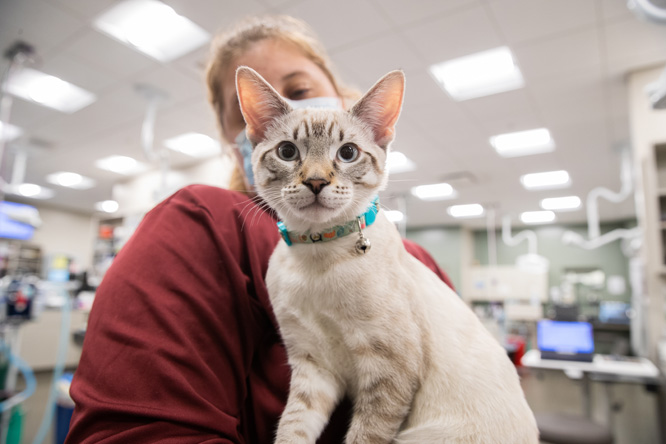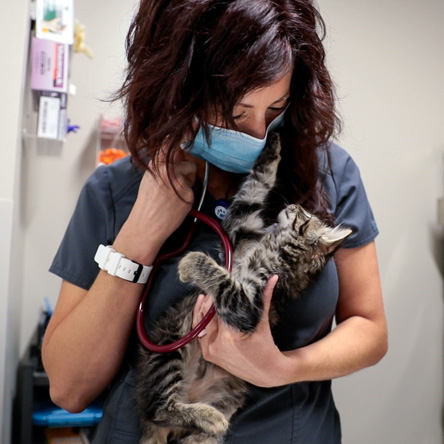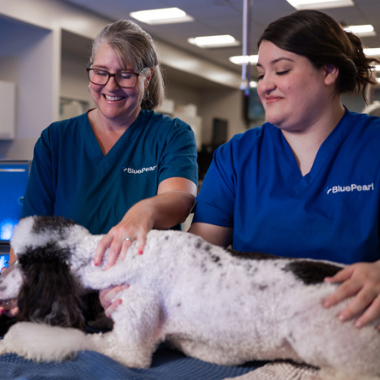Pet critical care by BluePearl.
Pet emergencies can be scary – we’re here to help you handle them.
We understand that seeing your pet sick, hurt or in distress can be stressful – especially if you don’t know what’s wrong. Fortunately, our experienced critical care clinicians are prepared to take action to provide lifesaving care

Conditions we treat.
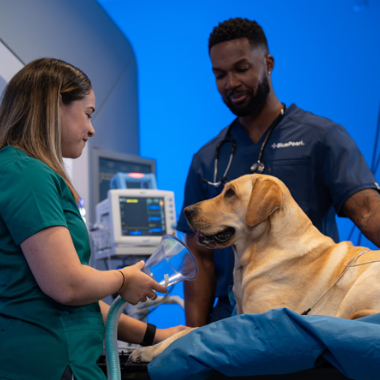
If your pet is experiencing a critical condition, you’ll have an entire veterinary team helping them so you can get back to what matters most – spending precious moments together.
Common cases that we see in the ICU include:
- Post-surgery recovery
- Trauma
- Sepsis
- Respiratory distress
- Pneumonia
- Shock
Services we offer.
Your pet will receive unparalleled medical care during their time at the hospital (and they’ll be spoiled with love and attention, too).
Advanced diagnostics
Your pet can’t tell us what’s wrong, so we use sophisticated diagnostics and imaging tools to uncover the source of the problem.
- Blood/urine testing
- Electrocardiography (ECG)
- Endoscopy
- Ultrasound
- Radiography (x-rays)
Treatment plans
Just as no two patients are the same, neither are their treatment plans. Our critical care team has experience with a range of advanced procedures and minimally invasive care options to get your pet on the path to wellness, including:
- Blood transfusions
- Electrolyte replenishment
- Oxygen therapy
- Breathing support
- Catheterization
- Nutritional support
- IV fluid therapy
Our board certified specialists and critical care team.
Experience makes all the difference.
Our critical care team is made up of veterinarians, vet technicians and assistants, and support staff with rigorous training and experience in specialty medicine. The team works hand in hand to provide the comprehensive, compassionate care your pet needs and deserves. Because we’re a multidisciplinary hospital, the team can consult the expertise of other specialty departments, too.
Christine Culler
DVM, MS, DACVECCDr. Christine Culler has published research covering a variety of topics including extracorporeal therapy, septic shock, abdominal bleeding from anaphylaxis and plasma products. She loves teaching and giving lectures at local and national veterinary conferences.
Her special interests include sepsis, trauma, intoxications, hypoalbuminemia and acute kidney injury. She is passionate about supporting clients in making decisions about critical illness and improving patient comfort through palliative care.
- Master of Science, Palliative Care, University of Maryland, College Park
- Fellowship, Extracorporeal Therapy, North Carolina State University, Raleigh
- Diplomate, American College of Veterinary Emergency & Critical Care
- Residency, Small Animal Emergency & Critical Care, The Ohio State University, Columbus
- Master of Science, Comparative Veterinary Medicine, The Ohio State University, Columbus
- Internship, Small Animal Medicine & Surgery, Wheat Ridge Animal Hospital, CO
- Bachelor of Science, Animal Health and Behavior, The Ohio State University, Columbus
Dr. Culler appreciates North Carolina’s beautiful weather and spends her free time kayaking, riding horses and gardening. She also likes painting, photography and road trips.
Michael Kato
DVM, DACVECCDr. Michael Kato is most interested in extracorporeal therapy, including hemodialysis, hemoperfusion and total plasma exchange. His clinical interests also include the management of respiratory, renal and cardiac critical illnesses.
- Diplomate, American College of Veterinary Emergency & Critical Care
- Residency, Emergency and Critical Care, North Carolina State University, Raleigh
- Internship, Small Animal Medicine & Surgery, VCA West Los Angeles Animal Hospital, CA
- Doctor of Veterinary Medicine, University of California, Davis
- Bachelor of Science, Animal Biology, University of California, Davis
Dr. Kato is an avid Los Angeles Dodgers baseball fan, and in his free time he enjoys cooking, traveling and hiking.
Rachel Moyle
DVM, DACVECCDr. Rachel Moyle is a dedicated clinician with interests in Interest in management of toxicities, snake envenomation, cardiac emergencies and hemodialysis.
- Diplomate, American College of Veterinary Emergency & Critical Care
- Residency, Small Animal Emergency & Critical Care, University of Florida, Gainesville
- Internship, Small Animal Emergency & Internal Medicine, Greenbrier Veterinary Referral Center, Chesapeake, VA
- Doctor of Veterinary Medicine, Virginia Polytechnic Institute and State University, Blacksburg
Dr. Moyle’s hobbies include biking, cooking and sprint triathlons. Her husband is an internist at BluePearl, and she has two dogs, Mabel and Gladys.
Scott Wells
DVM, DACVECCDr. Scott Wells is particularly interested in cases involving trauma, sepsis, postoperative ICU care and endoscopic foreign body removal.
- Diplomate, American College of Veterinary Emergency and Critical Care
- Residency, Emergency & Critical Care, New England Animal Medical Center, West Bridgewater MA
- Doctor of Veterinary Medicine, Virginia Polytechnic Institute and State University, Blacksburg
Dr. Wells is married with two daughters. He enjoys mountain biking and running.
What to expect.
We want you to be prepared for your pet’s visit to the ICU, so you have one less thing to worry about. Our entire BluePearl team will be with you every step of the way.
How the ICU works
First, your pet will be triaged and cared for by our emergency medicine team. If they require hospitalization, your pet will be seamlessly transferred to the ICU, where our critical care team will stabilize and monitor them around the clock.
We know how difficult it is to be separated from your pet during this critical time, so we’ll keep you updated on their condition and continue to discuss testing and treatment options with you. Once your pet is stable, you’ll be able to give them more love and attention during visiting hours.
Our team will continue to partner with your primary veterinarian as part of the ongoing management of your pet’s care.
You know your pet better than anyone, and you play a crucial role in any follow-up treatment necessary. If you have any concerns about providing care at home after being discharged from the hospital (such as giving medication or monitoring your pet’s symptoms), let us know – we’re here for you.
